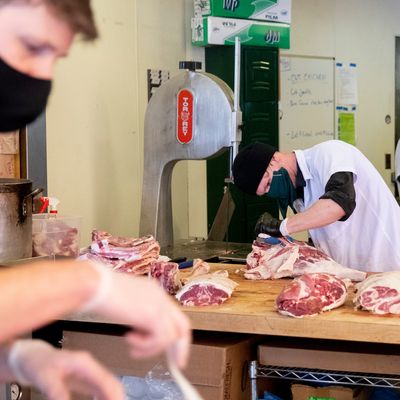
Donald Trump is calling on the American people to put the economy’s well-being above their own. On Tuesday, the president acknowledged that a mass reopening of nonessential businesses would likely accelerate the spread of coronavirus, which is already killing more than 1,000 Americans a day with most of the country on lockdown. Nevertheless, Trump insisted that a bit “more death” was a price worth paying for an immediate economic recovery.
“Will some people be affected badly? Yes,” the president said after touring a mask-making factory in Arizona. “But we have to get our country open and we have to get it open soon.” Trump encouraged Americans to view themselves as “warriors” whenever they leave their homes to engage in commerce.
To prevent essential workers from dodging this figurative draft, multiple Republican state governments are asking businesses to report furloughed employees who refuse to return to their jobs so that they may be denied any further unemployment benefits. To keep employers safe from lawsuits over endangering workers and customers, congressional Republicans have made liability protections for business owners their top demand in negotiations over the fourth coronavirus relief package. Finally, to ensure that concerns about workplace safety do not hinder the revival of corporate profitability, Trump’s Labor Department has declined to aggressively enforce CDC guidelines for private employers.
The moral problems with this plan are not subtle. Trump may want Americans to comport themselves as “warriors,” but he and his ilk will (once again) ride out the conflict far from the front lines. The trade-off he is proposing is not between economic revival and public health as abstract concepts, but rather, between higher rates of return for shareholders and lower rates of fatality for the (disproportionately nonwhite and low-income) workers whose jobs can’t be performed over Slack and Zoom. Put together the GOP’s positions on unemployment insurance, OSHA enforcement, and liability protections and you get a startling naked declaration of class war: Subordinate your family’s health to your boss’s profits or go hungry.
But the fundamental problem with “human sacrifice” as an economic recovery strategy has less to do with ethics than efficacy. Even if one puts as low a premium on (non-wealthy) human life as Donald Trump does, coercing workers back to their posts will not stop a deadly pandemic from thwarting business as usual. Even in economic terms, there is no substitute for public-health policies that enable workers to labor in good health, and consumers to shop with peace of mind.
The roiling crisis in America’s meatpacking plants testifies to these truths. Such plants are among the top vectors for the spread of the coronavirus in the United States. Only prisons and nursing homes rival slaughterhouses in their efficiency at disseminating disease. Meatpacking workers labor in close proximity in often unsanitary and poorly ventilated buildings densely packed with domestic animals; all hospitable conditions for a hungry virus. Roughly 170 meat plants have experienced COVID-19 outbreaks, sickening more than 9,000 people and killing at least 45 workers. All this illness has forced several plant closures and triggered meat shortages.
Last week, the Trump administration attempted to solve the crisis in the meat sector the same way it now intends to revive the broader economy: by ordering workers and employers to pretend the pandemic does not exist.
In an executive order, the president declared America’s meatpacking plants to be “critical infrastructure,” which Secretary of Agriculture Sonny Perdue could compel to remain open by invoking the Defense Production Act. Perdue has yet to assert that authority. But the Labor Department has issued special workplace guidelines for meat processing companies that purportedly supersede state and local regulations or closure orders. As University of Texas law professor Thomas McGarity told USA Today, “What it’s saying is, ‘If you order one of these outfits to close, we’re going to invoke the Defense Production Act to keep it open.’”
These guidelines are a suspension of workplace safety rules disguised as the opposite: Every measure dictated by the administration is qualified with a weasel clause that gives firms tacit permission to flout safety standards. “Modify the alignment of workstations, including along processing lines, if feasible,” the guidelines state, “so that workers are at least six feet apart in all directions … when possible.” The Labor Department further stipulates that employers need only make a “good-faith” effort to comply with these conditional rules.
All this may have been sufficient to shield meat companies against the threat of tort claims; on Tuesday, a Missouri judge threw out a lawsuit against Smithfield Foods, arguing that OSHA was in a better position to determine whether the company’s Milan plant was in compliance with federal guidelines. But Trump’s orders did little to nothing to make meatpacking plants less vulnerable to coronavirus outbreaks. Thus, closures and shortages have continued apace.
In the month before the president’s executive order, an average of eight meatpacking plants closed their doors due to COVID-19 outbreaks each week. In the week following Trump’s order, seven plants did. Meat production remains down by more than 35 percent from this time last year, according to data from the USDA. Spot shortages of meat have forced Wendy’s to alter its menu and Costco to limit meat purchases to three items per shopper. Meanwhile, Iowa’s Department of Public Health reported Tuesday that 1,600 meatpacking workers in the state have contracted coronavirus; at a Tyson pork processing plant in Perry, some 58 percent of workers tested positive for the virus.
Trump is right that forcing Americans back to work will result in “more death.” But he is wrong to think that it will restore economic growth. Only a public-health response that keeps workers healthy and consumers secure — whether through the development and distribution of an effective COVID-19 treatment or coronavirus vaccine, or the establishment of a robust test and tracing regime – can make American GDP grow again.






























